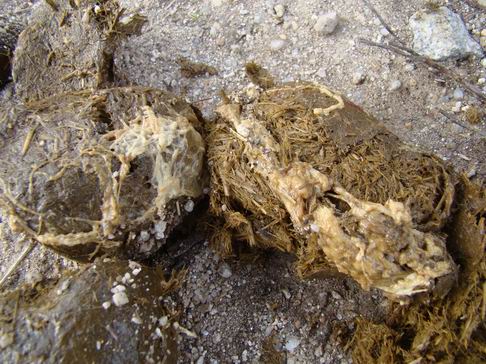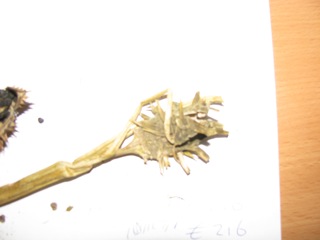Site Menu:
| This is an archived Horseadvice.com Discussion. The parent article and menus are available on the navigation menu below: |
| HorseAdvice.com » Diseases of Horses » Colic, Diarrhea, GI Tract » Colic in Horses » An Overview of Colic » |
| Discussion on Multi collic attack | |
| Author | Message |
| New Member: cavalon |
Posted on Monday, Nov 23, 2009 - 3:26 pm: The 25th of October all our 16 horses, who live in two different pastures, had a colic. Not all had a lot of problems, some just stopped eating and had no other signs, but a few had a lot of problems. Five of them had a lot of gas and one had his belly punctured by the vet to get rid of the gas. We thought this was caused by the change in food. We started 2 days before with new food,luzerne, they hadn't had this for 3 weeks. When we checked the muck of the horses we found some mucus.So we stopped the luzerne and started the other food (hay and straw with grains) again. After this colic the horses didn't eat well, only a little bit. About a week after this four horses weren't feeling well again, they didn't eat and lay on the ground. The others had no problem this time. The vet didn't had to come this time, they recovered quickly. At this time we dewormed the horses with ivermectine, we checked all the muck but only found a few worms. And after a few days a couple of other horses weren't feeling well. We didn't feed them a lot anymore at that time and gave them hay and grains. On November 6 a young mare, Hlyja, doesn't look ok. We watch her and after a while she has some muck and wants to eat. So she looks better. Sh doesn't have a lot of gas. The next morning she came to eat, but when the horses were moved to an other pasture with more grass, she lay down. She looked like in coma and we gave her a painkiller. She didn't respond to this and we called the vet. He gave her a stronger painkiller and gave her paraffin. She also didn't react to this. We brought her to the vet but she couldn't be saved anymore. It went really quick. Every time the horses had a colic we found mucus (see picture) Not always as much as on this picture. The horse from which this muck is had a red blood worm infection about 2 years ago, and still has some in his muck, so this is why you see one on this picture. He had a colic last Friday, the 20th of November together with two other horses. The other two didn't had a lot of problems but you could see they didn't feel well. They all recovered. At the moment we feed the horses hay, grain, straw with grain and they get some olive oil over their grains. We feed them 3 times a day. We have no idea what is causing this problem. They never had a problem with this food before, we've been giving this already since spring. It looks like they have some kind of intestinal infection. Do you know what we can do about this? And what might have caused it? We really don't know what to do anymore. 
|
| Member: scooter |
Posted on Monday, Nov 23, 2009 - 7:59 pm: Caval, since Dr.O. tries to make us think logically around here, I would have to almost guess it is something they are eating, just for the fact it happened to all the horses on the same day...what else could it be?Eating moldy stuff can cause this, I see you are from Portugal like anna? the way she talks it has been very wet there, and the straw is dusty/moldy? I would try to eliminate everything they are getting one at a time and see if any improvement occurs. I would go over everything they are fed with a fine toothed comb including the hay and look for any signs of spoilage. I had some bad gas colics once and could not figure out what was going on, all horses had it to a varying degree, turned out their pellets had barely visible mold growing on it, thankfully I only fed a handful at a time or it may have ended up worse. Also check your hay/straw/pasture for any poisonous weeds. In the picture of your manure is that fresh from the horse?? I know here in the summer when it is humid, the manure grows stuff on it that looks like that within a couple hours. |
| Member: juliem |
Posted on Monday, Nov 23, 2009 - 9:09 pm: Last Spring, I had two horses colic at exactly the same moment. The manure that was manually removed from both was covered with mucous. Turns out it was caused by the black locust wood chips that had just been dumped in my dry lot to control the mud. They nibbled on them for several hours, coliced and it was about a week to recovery. Not that yours is caused by the same thing, but some food stuff seems the logical cause. Dr. O found a reference that stated heavy mucous secretions were possible symptoms of black locust poisoning.Have your horses passed manure all along or did they go awhile without passing any? |
| Moderator: DrO |
Posted on Tuesday, Nov 24, 2009 - 6:59 am: Hello cavonatural,I am sorry to hear about this, I imagine 16 colics and one time is quite frightening. The mucous suggests either a colitis or prolonged transit time of the ingesta through the bowel. There are no intestinal infections of horses that behave this way attacking all the horses in two different herds in a 24 hour period. A toxin/intestinal irritant seems likely but let me ask you how did you introduce the alfalfa (lucerne) to the horse's diet? Certainly the new foodstuff introduced 48 hr before the incident is likely to figure in but it is not clear how. I would also be suspicious of possible foul play in such a case. One common problem associated with alfalfa that might cause such symptoms would be blister beetles so the alfalfa should be examined carefully for these. However they can be found in localized areas of the hay and you may have hit a bad spot that is now gone, Diseases of Horses » Colic, Diarrhea, GI Tract » Colic in Horses » Blister Beetle Poisoning. The only way to get to the bottom of this is going to be a thorough examination of the horses environment and feed for possible toxins. DrO |
| Member: mrose |
Posted on Tuesday, Nov 24, 2009 - 3:38 pm: I hope you are able to resolve this before loosing another horse. How frightening! Good luck. Please keep us posted as to what you find out. Thanks. |
| New Member: cavalon |
Posted on Wednesday, Nov 25, 2009 - 9:29 am: Thanks for your reactions.We did not give the horses a lot of alfalfa at once. And we stopped the alfalfa as soon as the horses had a colic but even then a few got a colic again. The manure on the picture is fresh, it was dry. Most of the horses were still passing on some manure. Only the really ill ones didn't pass any for a while. I have a question about Blister Beetles. I cannot find out where they live. I live in Portugal and I had never heard of them before. Do you know if they occur here?? An other question that comes to me is: Does anyone know if olives fresh from the tree are bad for horses? We have quite some olive trees and the horses love to eat the olives when they fall from the tree. At the moment the situation look stable. I hope it will keep this way. |
| Moderator: DrO |
Posted on Thursday, Nov 26, 2009 - 7:49 am: Concerning blister beetles all the references I have is that they are of worldwide incidence but I do not know about Portugal in particular. This would be a good question for your veterinarian.Concerning olives check out Diseases of Horses » Poisons , Venoms & Poisonous Plants » Poisons, Poisonous Plants, and Venomous Animals » Olive trees in pasture okay? Is there a correlation between the horses being exposed to olive fruit and the colics? DrO |
| Member: cavalon |
Posted on Sunday, Dec 20, 2009 - 10:12 am: Thanks for all the advice we got here.We finally found out what was causing the colic problems. We found a poisonous plant in the alfalfa, the Latin name is Datura stramonium. I don't know the English name. This is a picture of the plant.  In the meantime our horses have gained some weight and they are doing a lot better. |
| Member: mrose |
Posted on Sunday, Dec 20, 2009 - 11:26 am: Jimson weed. It can be deadly and is poisonous to people as well as animals. It is a very strong narcotic and is used in medicine similarly to belladona. Normally livestock won't eat it because it has a very better taste. |
| Member: vickiann |
Posted on Sunday, Dec 20, 2009 - 2:46 pm: Thanks, Cavalon, for letting us know about this.That is a very nasty weed. It is always good to have an answer to a mystery. Hope that your horses are doing well now. |
| Moderator: DrO |
Posted on Monday, Dec 21, 2009 - 8:07 am: Hello cavalonatural,Datura can cause poisoning with colic being a main symptom. The toxic principle is scopolamine, a sympathetic nervous system stimulator. The mucous that suggests inflammation above could instead be the result of the slowed down digestive function and prolonged transit time caused by the scopolamine... Another symptom that should be present with Datura poisoning is a remarkable and persistent mydriasis: abnormally wide opening of the pupils. This too is an effect of the scopolamine. Did you see this with your horses? It would have been most noticeable in bright light when a horses pupils are normally constricted way down. DrO |
Horseadvice.com
is The Horseman's Advisor
Helping Thousands of Equestrians, Farriers, and Veterinarians Every Day
All rights reserved, © 1997 -
is The Horseman's Advisor
Helping Thousands of Equestrians, Farriers, and Veterinarians Every Day
All rights reserved, © 1997 -
